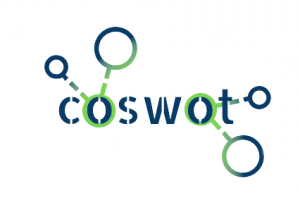 The Internet of Things connects physical devices offering sensing or actuating with their vicinity. The ever-growing capabilities of devices allow to imagine new architectures including them as first-class citizens. New added-value applications can then be envisioned in smart agriculture, smart buildings, smart cities, energy and water management, e-health and ageing well… The Web of Things (WoT) allows to describe the devices semantics, bridging the gap between the different domain and service descriptions. In today WoT architectures, physical devices can be located at distance from systems that perform reasoning. A centralised approach does not take advantage of the devices capabilities and induces suboptimal data transfers as well as server overload. Besides, many devices are now smart enough to discover each other, exchange data, and collectively make decisions.
The Internet of Things connects physical devices offering sensing or actuating with their vicinity. The ever-growing capabilities of devices allow to imagine new architectures including them as first-class citizens. New added-value applications can then be envisioned in smart agriculture, smart buildings, smart cities, energy and water management, e-health and ageing well… The Web of Things (WoT) allows to describe the devices semantics, bridging the gap between the different domain and service descriptions. In today WoT architectures, physical devices can be located at distance from systems that perform reasoning. A centralised approach does not take advantage of the devices capabilities and induces suboptimal data transfers as well as server overload. Besides, many devices are now smart enough to discover each other, exchange data, and collectively make decisions.CoSWoT objectives are to propose a distributed WoT-enabled software architecture embedded on constrained devices with two main characteristics: (1) it will use ontologies to specify declaratively the application logic of devices and the semantics of the exchanged messages; (2) it will add reasoning functionalities to devices, so as to distribute processing tasks among them. Doing so, the development of applications including devices of the WoT will be highly simplified: our platform will enable the development and execution of intelligent and decentralised smart WoT applications despite the heterogeneity of devices.
In CoSWoT, WoT applications will rely on a platform hosting the base services. Besides traditional services, it will host extensions that correspond to two scientific barriers:
(1) the use of ontologies as a generalised model for exchanges between heterogeneous devices. A joint statement from AIOTI WG3, IEEE P2413, oneM2M, W3C positions ontologies as key enablers for semantic interoperability on the WoT. However research questions remain concerning (i) the adequation of existing ontologies to the target application domains; (ii) the applicability of theoretical principles developed in a variety of protocols and standards, in the context of data streams; (iii) the discovery of heterogeneous devices, their services and how to solicit them.
(2) distributed and embedded incremental reasoning. Devices become powerful enough to offer storage and processing; new architectures appear, based on edge computing including devices such as sensors and actuators. The data streams provided by sensors require to perform incremental reasoning tasks. Research questions remain on (i) how to embed reasoning in devices with various capacities, it requires specific optimisations; (ii) how to efficiently distribute reasoning tasks among devices.
Smart agriculture is a typical application domain of such WoT architectures, where the surveillance of cultivated fields requires various sensors that push streaming data, which must be collected and reasoned upon to take decisions executed by actuators. Smart buildings is another such typical application domain where added-value application services involve other verticals such as energy management, e-health, or ageing well. We will define use cases and requirements for smart agriculture and smart buildings, run simulations, and then lead real experiments.
The CoSWoT platform will foster the decoupling of the development of software and the development of hardware, so as to ease the emergence of a new economic sector in the digital industry around WoT applications development, disconnected from the development of the smart devices themselves.
CoSWoT is led by Frédérique Laforest, INSA Lyon from 2020 to 2024. Partners are Mondeca, INSA Lyon, MINES Saint-Étienne, INRAe.
